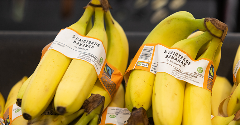News
Limiting trans fats in Kenyan food products could prevent heart disease
4 Apr 2024Implementing trans fat restrictions in Kenya could bring about significant health and economic benefits, saving lives and reducing healthcare costs, study finds.
Research by the George Institute for Global Health, published last year in the journal BMJ Global Health, assessed the potential health benefits and cost-effectiveness of implementing a mandatory limit on industrial trans fatty acids (iTFAs) in Kenyan food products.

The team concluded that adopting such regulations may prevent ischemic heart disease (IHD) events and deaths in Kenya, ultimately improving public health outcomes and decreasing healthcare costs. Kenya is currently considering policy options, but as of the date of publication, there are no limits set.
The researchers used a modelling method, incorporating data from the Global Burden of Disease study, observational studies, and policy implementation costs. The study modelled the adult Kenyan population, specifically individuals aged 20 and above, with a total population of 50 million.
The proposed intervention included implementing a mandatory limit on iTFAs to below 2% of all fats in the Kenyan food supply, compared with maintaining current trans-fat intake. The team found that over the first ten years, the intervention was estimated to prevent around 1,900 deaths from IHD and 17,000 IHD events. Healthcare savings of approximately $50 million were projected during this period.
Over the lifespan of the modelled population, the intervention could prevent around 49,000 IHD deaths and 113,000 IHD events, and lead to savings of an estimated $300 million. The intervention was predicted to save costs regardless of the time frame in which it was implemented.
Industrially produced trans fats linked to heart disease
Naturally occurring trans fats are found in trace amounts in dairy and meat products, whereas industrially produced trans fats were discovered in 1901 by German chemist Wilhelm Normann; they were first introduced to the food market in 1911 by Procter and Gamble by way of Crisco vegetable shortening.
The shortening product, made entirely of vegetable oil, had a long shelf life and was marketed as a better alternative to butter. It was not until the 1980s, long after these trans fats had become commonplace in food products around the world, that evidence began to emerge concerning the safety of trans fat present in hydrogenated fat. In the 1990s, studies started linking them to heart disease.
The primary dietary source of iTFAs is partially hydrogenated oils. These oils become solid at room temperature, making them a cheap and versatile option that is suitable for a variety of processed food items. These oils are still frequently used in processed foods such as microwave popcorn and frozen pizza.
Consuming iTFAs comes with a host of severe health risks, contributing to cardiovascular diseases, strokes, and various non-communicable diseases. Over 278,000 people die worldwide each year attributable to the intake of iTFAs, according to the World Health Organization (WHO).
Kenyan food manufacturers urged to remove trans fats from products
Despite the clear benefits of iTFA limitation, Kenya faces challenges in implementing effective regulations and monitoring systems. The country does have a national strategy that aims to eliminate trans fats, but it lacks effective implementation procedures and monitoring systems, according to the Nigerian Health Foundation.
To address these challenges and improve public health outcomes, Dr Matti Marklund, lead author of the study and senior research fellow at the George Institute, is urging food manufacturers to eliminate trans fats from their products.
He said: “Our findings show that even in Kenya, where trans-fat intakes appear to be relatively low, there could still be significant health and economic benefits to trans-fat elimination. Instead of waiting for government mandates, we urge food manufacturers to prioritise consumers’ health now by removing these dangerous fats from products.”
Several countries have eliminated iTFAs from their foods
The WHO’s global initiative Replace Trans Fat was introduced in 2018 to eliminate iFTAs from the global food supply chain by 2023. This was not met, and the WHO now calls for accelerated global action and aims to complete this effort by the end of 2025.
Since the introduction of the initiative, various countries have taken steps to limit trans-fat consumption in processed foods, with different degrees of progress and success. Among them was Turkey, which in 2020 implemented regulations limiting the use of iTFAs in food products.
In 2021, Nigeria committed to introducing a mandatory 2% trans-fat limit in oils, fats, and processed foods, and in 2023 passed a best practice trans-fat elimination policy, setting an example for other African nations to follow. In June 2023, the Philippines banned the use of trans fat in pre-packaged foods.
As of last month, 53 countries have best practice policies in place to combat iTFAs, covering 46% of the world's population. To support countries in their efforts and to celebrate their achievements, the WHO has begun awarding validation certificates to countries for eliminating iTFAs from their foods.
In January, Denmark, Lithuania, Poland, Saudi Arabia, and Thailand received the first-ever validation certificates from the WHO.
Related news

Cocoa prices likely to increase significantly in 2024
27 Mar 2024
Due to environmental factors, the International Cocoa Organization predicts an 11% drop in global cocoa output, driving cocoa prices up and raising concerns for farmers' livelihoods.
Read more
Ultra-processed food intake in South Africa at concerning levels, study suggests
19 Mar 2024
As South Africa considers introducing front-of-pack warning labels and strict marketing limits for unhealthy foods, research has found that low-income South Africans get around half of their calories from ultra-processed foods (UPFs) – “a cause for con...
Read more
Sainsbury’s reaches living wage goal for banana workers
12 Mar 2024
UK supermarket Sainsbury’s announces it has achieved its industry commitment three years ahead of schedule and encourages other retailers to do the same.
Read more